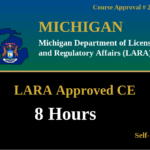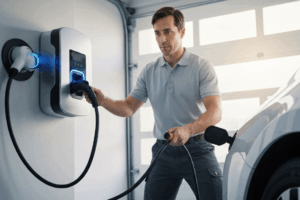
EV Charging Station Growth in Michigan: A Career Opportunity
The Scale of Michigan’s EV Ambition
To understand the opportunity, you have to look at the numbers. Michigan is currently working toward an ambitious goal to support two million electric vehicles on the road by 2030. To close that gap, a robust charging network is non-negotiable. This expansion is being supercharged by significant public and private investment. Programs like the Charge Up Michigan program, managed by the Department of Environment, Great Lakes, and Energy (EGLE), are providing grants for DC fast charging stations along key travel corridors. This initiative, combined with significant federal funding from the National Electric Vehicle Infrastructure (NEVI) program, is creating a wave of large-scale projects perfect for seasoned electrical contractors.
On top of state and federal funds, major utility rebate programs in Michigan are fanning the flames. Companies like DTE Energy and Consumers Energy are offering substantial rebates for both commercial and residential installations, making the switch more attractive for customers and creating a steady stream of work for electricians. DTE, for instance, offers rebates up to $500 for a residential Level 2 charger installation and even larger incentives for commercial properties.
What This Means for Your Electrical Career
The statewide push for EV infrastructure is creating distinct and lucrative workstreams for electricians at every level. Whether you’re a residential electrician or a journeyman electrician leading commercial projects, there is a growing demand for your expertise.
The Booming Residential Market
For most EV owners, charging happens at home. This has created a massive market for Level 2 charging station installation in garages across Michigan. As a residential electrician, this is your sweet spot. The typical job involves more than just mounting a charger to the wall. It requires a professional assessment of the home’s electrical system, including:
- Electrical load calculation for EV charging: Per NEC 220.57, the EVSE load must be calculated at 7200 volt-amperes or the nameplate rating, whichever is larger. This is a critical safety measure to ensure the home’s service can handle the continuous load and prevent overloads. Additionally, Article 625.54 requires all receptacles for EV charging to have GFCI protection for personnel.
- Electrical panel upgrade for EV: Many older homes have 60- or 100-amp panels that are insufficient for a modern EV charger. Upgrading the service panel is a common and profitable part of a home EV charger installation.
- Installing a dedicated 240V outlet for EV charger: This often involves running a new circuit from the panel to the garage to support a hardwired charger or a high-power receptacle like a NEMA 14-50 outlet.
This residential boom provides a consistent and reliable source of high-value service calls, allowing electricians to become local experts in this fast-growing niche.
Commercial and Public Infrastructure Projects
Beyond the garage, the need for public and commercial charging is exploding. This is where experienced journeyman electricians and larger contracting firms can truly capitalize. These projects are larger in scope and include installing banks of Level 2 chargers at workplaces and retail locations, as well as becoming a certified DC fast charger electrician for highway corridor projects. These installations require a deep understanding of:
- Commercial EV charger incentives: Businesses are motivated by significant rebates from utilities and the federal government, but they need knowledgeable contractors to help them navigate the options and install qualifying equipment.
- EV charging station permits: Navigating the permitting process with local authorities is crucial for commercial jobs. Experienced contractors who understand the Michigan electrical code for EV chargers and local requirements can provide immense value to clients.
- Complex Power Requirements: DC fast charging stations have immense power needs, often requiring coordination with the utility company, new service transformers, and heavy-duty switchgear.
Staying Ahead of the Curve: Skills and Certifications
To succeed in the EV charging market, staying current with technology and regulations is key. The National Electrical Code (NEC) EVSE standards, found primarily in Article 625, are the foundation of this work. The State of Michigan adopted the 2023 NEC, making the Michigan Electrical Code (incorporating the 2023 NEC) effective as of March 12, 2024. This code, which includes state-specific amendments, applies to new electrical installations statewide and introduces important updates you need to know for safe and efficient installations.
Here are some key areas for professional development:
- Understanding NEC 2023 Changes: New rules are changing EV charger installation requirements. For instance, 2023 NEC changes affect EVSE load calculations and adjustable settings, which is critical for every job. It’s also important to know how the 2023 NEC simplifies electric vehicle branch circuit requirements for certain installations, potentially saving time and money. Learning how 2023 NEC rules are changing EV charger installation requirements overall will set you apart.
- EVSE Technician Training: Specialized training programs are emerging to meet the demand for skilled installers and service technicians.
- EVITP Certification in Michigan: The Electric Vehicle Infrastructure Training Program (EVITP) is a nationally recognized certification that is increasingly sought after for public and commercial projects. Becoming certified demonstrates a high level of expertise in EVSE installation and safety.
- Smart Charger Integration: Modern chargers do more than just deliver power. Understanding smart charger integration with home energy systems, utility demand-response programs, and payment networks is a valuable, future-proof skill.
Whether you’re just starting at an electrician school or you’re a seasoned pro, investing in online electrical courses focused on these topics is a smart career move.
Seize the Opportunity in the Great Lakes State
The transition to electric vehicles is reshaping Michigan’s identity and its economy. For the state’s electricians, the growth of the EV charging station Michigan network represents a once-in-a-generation opportunity. It’s a chance to build a valuable, in-demand specialty that offers both career stability and significant growth potential. By investing in the right training, understanding the available incentives, and mastering the specific requirements of EVSE installation, you can position your business at the forefront of this electrical revolution.
Ready to power up your career? ExpertCE offers a full suite of courses to keep you up-to-date on the latest NEC changes and industry trends. Browse our courses today to get started.
Michigan Continuing Education Courses
Explore our board-approved continuing education courses for Michigan professionals:
View CE RequirementsMichigan – 15 hours NEC 2023 Code Changes Update
Michigan – 8 hours NEC 2023 Changes for Sign Specialist
Disclaimer: The information provided in this educational content has been prepared with care to reflect current regulatory requirements for continuing education. However, licensing rules and regulations can vary by state and are subject to change. While we strive for accuracy, ExpertCE cannot guarantee that all details are complete or up to date at the time of reading. For the most current and authoritative information, always refer directly to your state’s official licensing board or regulatory agency.
NEC®, NFPA 70E®, NFPA 70®, and National Electrical Code® are registered trademarks of the National Fire Protection Association® (NFPA®)





